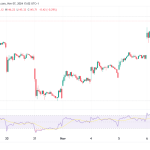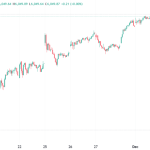
Retailers in the United Kingdom (TADAWUL:4280) are facing a challenging outlook as sentiment about their business situation over the next three months has sharply declined, according to the latest findings from the Confederation of British Industry (CBI). The CBI’s quarterly Distributive Trades Survey, released this November, indicates that retailer sentiment fell at the fastest rate in two years.
In the year to November, retail sales volumes saw a moderate decline, with a weighted balance of -18%, a dip from -6% in October. Retailers have reported sales as “poor” for the time of year, a sentiment consistent with the previous month. There is an expectation that annual sales growth will further deteriorate in December, with sales volumes set to remain below seasonal norms, though the anticipated shortfall is less severe than in November.
Retailers are also bracing for a decline in capital expenditure over the next twelve months compared to the past year, reflecting weakened consumer demand and falling confidence. Employment in the sector has fallen over the past year to November at the slowest rate since November 2023, and retailers predict that headcount will remain broadly the same in December.
Notably, selling price inflation has eased in the year to November, with a balance of +24% compared to +30% in August, staying below the long-run average for the third consecutive quarter. However, an acceleration is expected in December, with retailers predicting a balance of +33%.
The wider distribution sector, which includes retail, wholesale, and motor trades, also experienced a contraction in sales volumes at a moderate pace in the year to November, with firms anticipating sales to fall at the same rate in December.
Ben Jones, Lead Economist at the CBI, highlighted the severity of the situation, stating that the level of gloom among retailers has not been seen since the peak of the inflation shock in November 2022. Jones emphasized the impact of upcoming fiscal changes, such as the rise in Employers’ National Insurance and increased business rates for higher-value properties, which are expected to hit retailers hard by adding significant operational costs. He urged the government to urgently collaborate with the business community to mitigate the cumulative cost burden that threatens to impair investment and hiring, while also leading to higher prices for consumers.
This article was generated with the support of AI and reviewed by an editor. For more information see our T&C.







